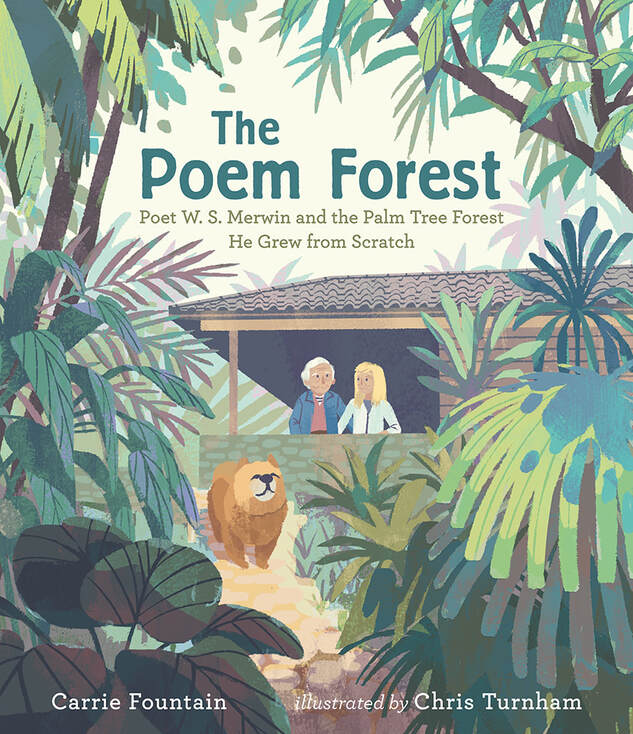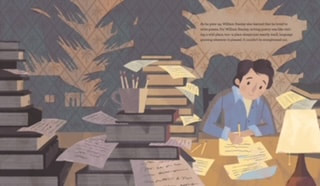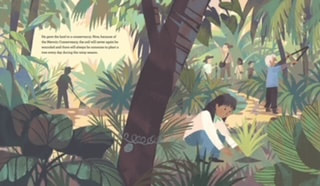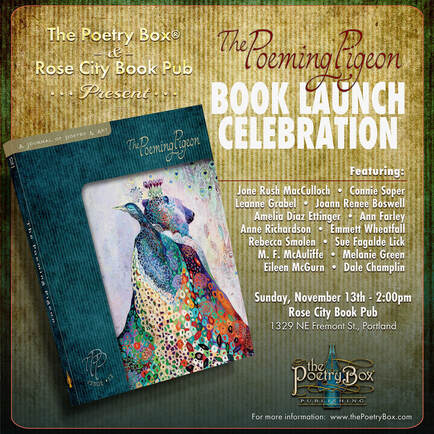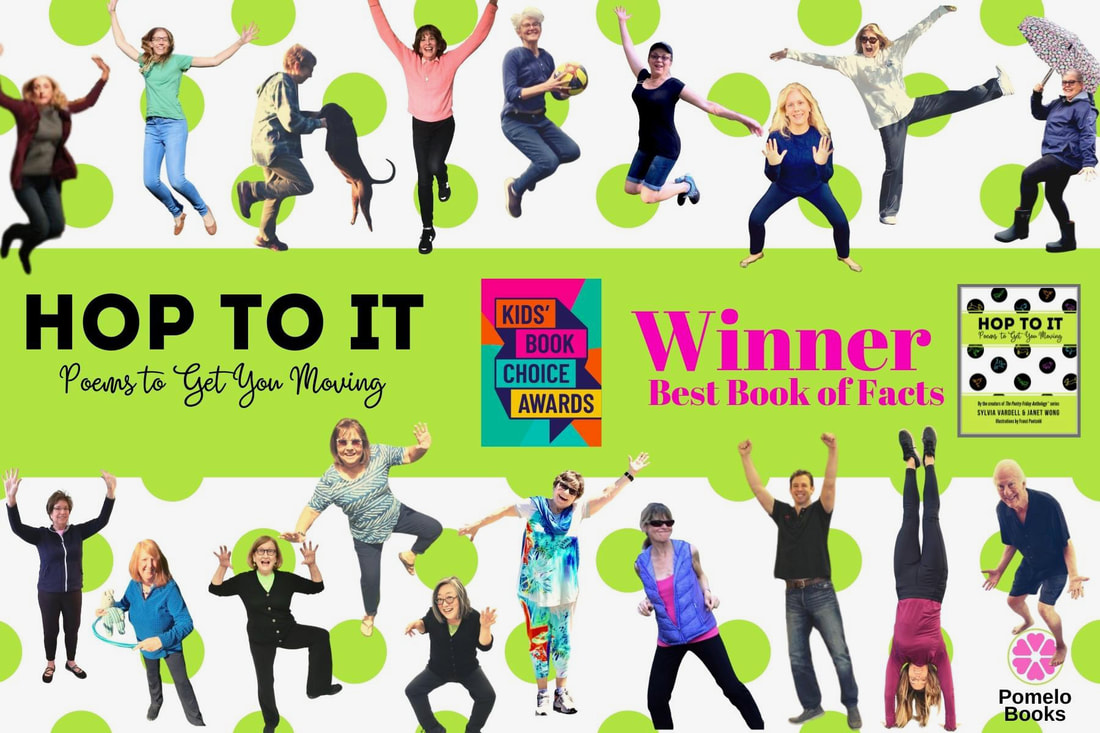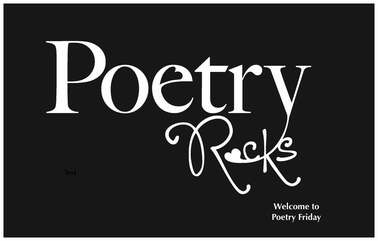 Today, Heidi at my juicy little universe is hosting Poetry Friday. Heidi has a n important PSA about voting, Plus a whimsical challenge for us. Did you know that Nov 14-20, 2022 is Folk Tale Week. Read about it at my juicy little universe. There are some wonderful prompts. Last Spring, I connected with Anne Irza-Leggat from Candlewick about interviewing poets. Carrie Fountain is the final of the four poets I interviewed. The Poem Forest is her first book for children but it's not her last one. 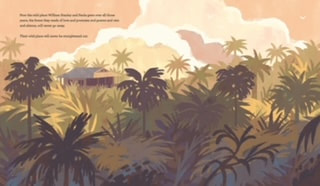 JRM: What drew you to the idea of writing about W. S. Merwin’s love of trees and ecology? CF: As a poet myself, I came to know W.S. Merwin first through his writing. When I came to learn of his moving to Maui and planting trees, it just struck me as a perfect story for kids. Merwin made his environmental activism a part of his everyday life. I think it can sometimes feel very overwhelming for kids (and adults!) to contemplate their actions against the large, swirling problem of, say, climate change. And I think Merwin's story offers inspiration: small, everyday commitments can make a difference. This is convenient, as our small, everyday lives are all that we have to work with. JRM: What was your process for writing this book? CF: Really, my desire for this story was to make a connection between Merwin's writing practice and his planting practice. A lifetime commitment to writing means a commitment to sitting down to do it everyday. I think some people imagine poets as people who walk around waiting for inspiration to strike and then jotting down whatever comes to them, and boom: a poem comes to you whole and finished. But that's not how it works! You can't plant a forest all at once. Like writing, it's something you attend to daily. I started writing this book with that idea in mind, and then read everything Merwin wrote about how he found his piece of land, how it was in very bad shape, and how over many years he went out daily to plant palm trees. There was something so meaningful to me in that commitment. And I thought it'd be meaningful to kids, too. JRM: I think one of the best parts about writing is doing research for a topic. What kind of research did you do for The Poem Forest? CF: Merwin wrote (very beautifully) about how he came to make the palm forest, and read everything I could find. Then I read his memoir Summer Doorways and learned more about his early life, and his longing to be in wild places, and his concerns about the environment and his deep sense of place. Rereading his poetry with the wider knowledge of his life, I was able to see how the line between the palms and the poems slowly begins to thin. There is so much meaning and metaphor taken from his experience in planting and living among the palms. JRM: What was the most surprising discovery you had in writing this book? CF: When Merwin first found the plot of land on which he'd plant his forest, it had been a failed pineapple plantation. I knew the basic story--the soil had been misused and needed repair. But I was surprised to learn just how much faith he'd had in that particular spot. People tried to talk him out of buying it. In the record books there was a note about the parcel that read "Nothing will grow here." Merwin wasn't a rich man with money to burn. So the fact that he allowed the land to speak to him, and that he took that chance and made that commitment was doubly inspiring to me. It makes one reflect on choices one has made in one's own life, and how it's best to truly look for room for challenge and faith and promise, rather than playing it safe. JRM: What is one of your favorite W. S. Merwin poems? CF: There are so many. I included his poem "Palm" at the end of the book--and I love that poem. He wrote many poems about the forest and about the palms. But I think my favorite W.S. Merwin poem is called "Thanks." It's a poem about our human pull toward offering gratitude, even in the face of great problems beyond our control. It ends: with nobody listening we are saying thank you thank you we are saying and waving dark though it is JRM: This is your first children’s book. What differences( if any )did you find writing for a target audience of children versus adults? CF: I think a lot of that is instinct, and remembering how smart and funny kids are. There are differences between these two audiences, but when you start focusing on the differences--what you can and can't say--you get into trouble. I like to imagine my own kids as my readers, and knowing how deep and philosophical they can be, I feel very comfortable going places that might feel very "adult" to others. So often I find children have much better access to the big, hairy, existential questions of life. JRM: Will there be more books for children in the future? What are your upcoming projects? CF: YES! I'm currently working on a book about work. I've always been fascinated by the idea of what people do all day. This book is a playful investigation of what work means, and what people actually do at their jobs. I want to celebrate the dignity of work and showcase jobs that don't always get attention in children's books. I think a lot of kids have trouble finding their own parents' jobs represented in books--and so I thought I'd write a book for them. Thank you, Carrie, for this great interview. I loved The Poem Forest so much. I am looking forward to your new book. If you would like to win a copy of The Poem Forest, leave a comment. a winner will be selected next week. Thanks to Anne Irza-Leggat from Candlewick for offering a copy to someone. |
AuthorAll photos and poems in these blog posts are copyrighted to Jone Rush MacCulloch 2006- Present. Please do not copy, reprint or reproduce without written permission from me. Categories
All
Archives
July 2024
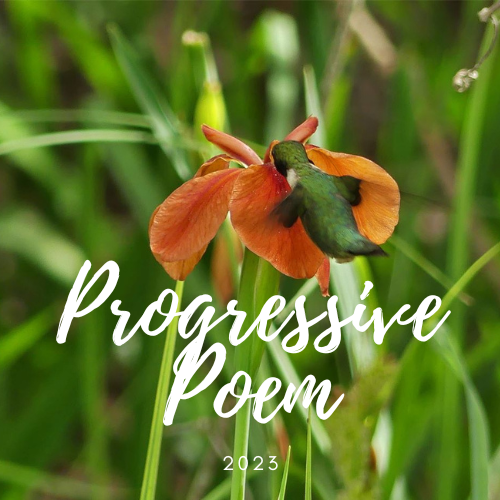
2023 Progressive Poem
April 1 Mary Lee Hahn, Another Year of Reading April 2 Heidi Mordhorst, My Juicy Little Universe April 3 Tabatha, The Opposite of Indifference April 4 Buffy Silverman April 5 Rose Cappelli, Imagine the Possibilities April 6 Donna Smith, Mainely Write April 7 Margaret Simon, Reflections on the Teche April 8 Leigh Anne, A Day in the Life April 9 Linda Mitchell, A Word Edgewise April 10 Denise Krebs, Dare to Care April 11 Emma Roller, Penguins and Poems April 12 Dave Roller, Leap Of Dave April 13 Irene Latham Live You Poem April 14 Janice Scully, Salt City Verse April 15 Jone Rush MacCulloch April 16 Linda Baie, TeacherDance April 17 Carol Varsalona, Beyond Literacy Link April 18 Marcie Atkins April 19 Carol Labuzzetta at The Apples in My Orchard April 20 Cathy Hutter, Poeturescapes April 21 Sarah Grace Tuttle, Sarah Grace Tuttle’s Blog, April 22 Marilyn Garcia April 23 Catherine, Reading to the Core April 24 Janet Fagal, hosted by Tabatha, The Opposite of Indifference April 25 Ruth, There is no Such Thing as a God-Forsaken Town April 26 Patricia J. Franz, Reverie April 27 Theresa Gaughan, Theresa’s Teaching Tidbits April 28 Karin Fisher-Golton, Still in Awe Blog April 29 Karen Eastlund, Karen’s Got a Blog April 30 Michelle Kogan Illustration, Painting, and Writing |
